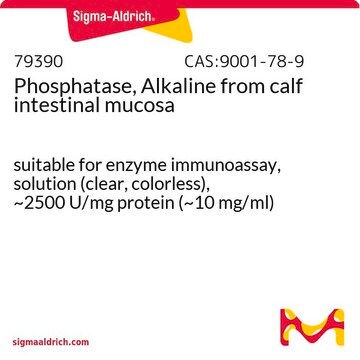APMB-RO
Roche
Alkaline Phosphatase
solution, from bovine (calf) intestine, 2 units/μg protein, optimum pH 7.5-9.5
Synonym(s):
ALP, CAP, CIAP, calf intestinal phosphatase, cip, orthophosphoric monoester phosphohydrolase
Sign Into View Organizational & Contract Pricing
All Photos(1)
About This Item
Recommended Products
biological source
bovine (calf) intestine
Quality Level
form
solution
specific activity
2 units/μg protein
packaging
pkg of 1,000 U (10713023001 [1 U/μl])
pkg of 1,000 U (11097075001 [20 U/μl])
manufacturer/tradename
Roche
parameter
37 °C optimum reaction temp.
optimum pH
7.5-9.5
shipped in
wet ice
storage temp.
2-8°C
General description
Alkaline phosphatase (ALP) is a glycoprotein that is expressed ubiquitously. This enzyme is bound to the cell membrane. Activation of ALP requires essential co-factors, such as zinc and magnesium. Alkaline phosphatase catalyzes the removal of phosphate groups from various compounds that are phosphorylated. Alkaline phosphatase from calf intestine hydrolyzes 5′-monophosphate groups from both DNA and RNA. It can also hydrolyze 5′-diphosphate and 5′-triphosphate groups from RNA. Hence, intestinal ALP is one of the commonly used enzymes in molecular cloning.
Application
Use this preparation of calf intestinal alkaline phosphatase to remove 5′-terminal phosphates from DNA or RNA and immunoprecipitated RNA samples.
Note: The 11097075001 preparation has a high concentration of enzyme (20 U/μl), which is convenient for large-scale experiments. The 10713023001 preparation is a lower concentration (1 U/μl), which is convenient for small-scale experiments.
Note: The 11097075001 preparation has a high concentration of enzyme (20 U/μl), which is convenient for large-scale experiments. The 10713023001 preparation is a lower concentration (1 U/μl), which is convenient for small-scale experiments.
Sequence
AP is a zinc-containing enzyme with 4 atoms zinc per molecule (Efstradiatis, 1977).
Unit Definition
One unit of alkaline phosphatase is the enzyme activity which hydrolyzes 1 mol of 4-nitrophenyl phosphate in 1 minute at +37 °C under assay conditions.
Note: According to Moessner et al. 5 units alkaline phosphatase (+37 °C; diethanolamine buffer) correspond to 1 unit alkaline phosphatase (+25 °C; glycine/NaOH buffer).
Unit Conversion: Approx. 3.6 U (MB grade AP)
[+37 °C, 4-NPP as substrate, diethanolamine as buffer, pH 9.8] = 1 U [+25 °C, 4.NPP as substrate, glycine as buffer, pH 10.5].
Volume Activity: 20 U/μl for the 11097075001 preparation. 1 U/μl for the 10713023001 preparation.
Note: According to Moessner et al. 5 units alkaline phosphatase (+37 °C; diethanolamine buffer) correspond to 1 unit alkaline phosphatase (+25 °C; glycine/NaOH buffer).
Unit Conversion: Approx. 3.6 U (MB grade AP)
[+37 °C, 4-NPP as substrate, diethanolamine as buffer, pH 9.8] = 1 U [+25 °C, 4.NPP as substrate, glycine as buffer, pH 10.5].
Volume Activity: 20 U/μl for the 11097075001 preparation. 1 U/μl for the 10713023001 preparation.
Physical form
10713023001: Enzyme solution (1 U/μl) in storage buffer, pH 7.6 (20 °C)
11097075001: Enzyme solution (20 U/μl) in storage buffer, pH 7.6 (20 °C)
11097075001: Enzyme solution (20 U/μl) in storage buffer, pH 7.6 (20 °C)
Preparation Note
Working solution: Storage buffer: 25 mM Tris-HCl, 1 mM MgCl2, 0.1 mM ZnCl2, glycerol 50% (v/v), pH 7.6 (4 °C).
Storage conditions (working solution): Dilutions (1 to 5 U/μl) of MB grade AP in the storage buffer are stable for 17 months at 2 to 8 °C.
Higher Dilutions (~0.01 U/μl) should be made fresh daily and kept at 2 to 8 °C.
Preventing self-ligation of vectors during cloning
If a linearized vector lacks a 5′ phosphate, it cannot ligate to itself or form concatamers that contain multiple copies of the vector. Thus, the product of the ligation reaction is predominantly recombinant DNA (vector + DNA insert), rather than religated plasmid.
Inactivation: Add 1/10 volume of EGTA to the reaction mix and incubate at +65°C for 10 minutes. To ensure complete inactivation of enzyme, extract the mix with phenol/chloroform/isoamyl alcohol to remove all protein.
Storage conditions (working solution): Dilutions (1 to 5 U/μl) of MB grade AP in the storage buffer are stable for 17 months at 2 to 8 °C.
Higher Dilutions (~0.01 U/μl) should be made fresh daily and kept at 2 to 8 °C.
Preventing self-ligation of vectors during cloning
If a linearized vector lacks a 5′ phosphate, it cannot ligate to itself or form concatamers that contain multiple copies of the vector. Thus, the product of the ligation reaction is predominantly recombinant DNA (vector + DNA insert), rather than religated plasmid.
Inactivation: Add 1/10 volume of EGTA to the reaction mix and incubate at +65°C for 10 minutes. To ensure complete inactivation of enzyme, extract the mix with phenol/chloroform/isoamyl alcohol to remove all protein.
Other Notes
For general laboratory use.
Storage Class Code
12 - Non Combustible Liquids
WGK
WGK 1
Flash Point(F)
does not flash
Flash Point(C)
does not flash
Choose from one of the most recent versions:
Already Own This Product?
Find documentation for the products that you have recently purchased in the Document Library.
Customers Also Viewed
Xiangyu Chen et al.
PLoS biology, 13(12), e1002329-e1002329 (2015-12-20)
Interhomolog crossovers promote proper chromosome segregation during meiosis and are formed by the regulated repair of programmed double-strand breaks. This regulation requires components of the synaptonemal complex (SC), a proteinaceous structure formed between homologous chromosomes. In yeast, SC formation requires
Alkaline Phosphatase
Lowe D, et al
Journal of Separation Science (2023)
Erratum: Mapping Argonaute and conventional RNA-binding protein interactions with RNA at single-nucleotide resolution using HITS-CLIP and CIMS analysis.
Michael J Moore et al.
Nature protocols, 11(3), 616-616 (2016-02-26)
Alkaline Phosphatase.
Green, Michael R and Sambrook, Joseph
Cold Spring Harbor Protocols, 100768-100768 (2020)
Qiang Zhao et al.
Physiologia plantarum, 174(4), e13731-e13731 (2022-06-20)
Saline-alkali (SA) stress induces excessive reactive oxygen species (ROS) accumulation in plant cells, resulting in oxidative damages of membranes, lipids, proteins, and nucleic acids. Melatonin has antioxidant protection effects in living organisms and thus has received a lot of attention.
Our team of scientists has experience in all areas of research including Life Science, Material Science, Chemical Synthesis, Chromatography, Analytical and many others.
Contact Technical Service






